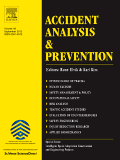
ACCIDENT ANALYSIS AND PREVENTION
Scope & Guideline
Leading the Charge in Accident Analysis
Introduction
Aims and Scopes
- Traffic Safety Research:
The journal prioritizes studies that investigate factors contributing to traffic accidents, including behavioral, environmental, and infrastructural influences, aiming to identify effective interventions for reducing collision rates. - Human Factors and Driver Behavior:
Research on human behavior in driving contexts is a core focus, exploring how cognitive, emotional, and social factors influence driving performance, decision-making, and risk-taking. - Automated and Connected Vehicle Safety:
With the rise of automated driving technologies, the journal emphasizes research on the safety implications of connected and automated vehicles, examining their interactions with human drivers and vulnerable road users. - Crash Prediction and Risk Assessment:
The journal publishes methodologies for predicting crash occurrences and evaluating risks, employing advanced statistical and machine learning techniques to enhance the predictive capabilities of safety assessments. - Pedestrian and Vulnerable Road User Safety:
A significant scope involves research aimed at understanding and improving the safety of pedestrians, cyclists, and other vulnerable road users, addressing their interactions with motor vehicles. - Policy and Infrastructure Evaluations:
The journal also considers studies evaluating the effectiveness of road safety policies and infrastructure designs, contributing to evidence-based decision-making in transport planning.
Trending and Emerging
- Integration of Artificial Intelligence and Machine Learning:
Recent publications highlight the increasing use of AI and machine learning techniques in crash prediction and risk assessment, showcasing their potential to analyze large datasets and improve safety outcomes. - Focus on Vulnerable Road Users:
There is a growing emphasis on understanding the safety of vulnerable road users, particularly in the context of interactions with automated vehicles, reflecting societal shifts towards more inclusive road safety measures. - Behavioral Insights and Psychological Factors:
Research is increasingly exploring the psychological aspects of driving behavior, including emotional and cognitive factors that influence risk perception and decision-making, particularly in the context of distracted driving. - Real-Time Data Utilization:
Emerging studies are leveraging real-time data from connected vehicles and smart infrastructure, aiming to enhance situational awareness and improve safety interventions dynamically. - Impact of Environmental Factors:
There is an emerging focus on how environmental conditions, such as weather and urban design, influence crash risks and driver behavior, indicating a more holistic approach to road safety.
Declining or Waning
- Traditional Crash Analysis Methods:
There appears to be a waning interest in conventional statistical methods for crash analysis, as researchers increasingly adopt machine learning and advanced modeling techniques that provide more nuanced insights. - Generalized Driver Behavior Studies:
General studies on driver behavior without specific context or application are less frequent, with a shift towards more targeted research that addresses specific populations or conditions. - Non-automated Driving Research:
As the field evolves, studies centered exclusively on non-automated driving contexts are becoming less common, with more emphasis on how automation influences driver behavior and safety. - Basic Safety Education Programs:
Research focused on basic road safety education programs is diminishing, likely due to a growing emphasis on integrated approaches that combine education with technology and policy interventions. - Single-Factor Analysis of Crashes:
There is a noticeable decrease in studies that analyze crashes based on single factors, as contemporary research increasingly recognizes the complex interplay of multiple variables in accident causation.
Similar Journals

Journal of Transportation Engineering Part A-Systems
Connecting Knowledge with Practice in Transportation EngineeringThe Journal of Transportation Engineering Part A-Systems, published by the American Society of Civil Engineers (ASCE), is a cutting-edge, peer-reviewed journal dedicated to the advancement of knowledge in the field of transportation systems. With an ISSN of 2473-2907 and an E-ISSN of 2473-2893, this journal serves as a crucial resource for researchers, professionals, and students interested in the intricate interplay between civil engineering and transportation networks. Boasting a Q2 ranking in both the Civil and Structural Engineering and Transportation categories, this journal reflects the high-quality research contributing to these vital disciplines. Accessible through open-access options, the journal provides a platform for innovative ideas and research findings from 2017 to 2024, aiming to address contemporary challenges in transportation systems while fostering interdisciplinary collaboration. As an essential outlet for scholarly work in the United States and beyond, the Journal of Transportation Engineering Part A-Systems is committed to enhancing the understanding of complex transportation dynamics and the development of sustainable and efficient infrastructures.
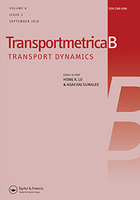
Transportmetrica B-Transport Dynamics
Pioneering Insights in Transport DynamicsTransportmetrica B: Transport Dynamics is a premier academic journal published by Taylor & Francis Ltd, focusing on innovative research in the fields of transportation dynamics, modeling, and simulation. Established in 2013 and running through 2024, this journal holds a prestigious Q1 ranking in Modeling and Simulation, Software, and Transportation categories, reflecting its commitment to high-quality scholarship. With an impactful presence, evidenced by its Scopus rankings—73rd in Mathematics, 57th in Social Sciences, and 174th in Computer Science—Transportmetrica B serves as a critical platform for researchers, professionals, and students seeking to explore and disseminate groundbreaking findings in transport dynamics. The journal is accessible via open access options, ensuring that its valuable insights reach a global audience. As the field of transport continues to evolve, Transportmetrica B remains at the forefront, championing extensive research and development that address the challenges of modern transportation systems.
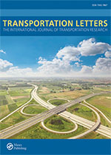
Transportation Letters-The International Journal of Transportation Research
Empowering researchers to navigate the complexities of transport.Transportation Letters - The International Journal of Transportation Research, published by Taylor & Francis Ltd, is a leading journal dedicated to advancing the field of transportation studies. With an impact factor that reflects its significance within the academic community and a prestigious ranking of Q2 in Transportation, this journal provides a critical forum for the dissemination of innovative research and insights in transportation systems, policies, and technologies. Covering a broad scope of topics from urban mobility to logistics and infrastructure, Transportation Letters serves as an essential resource for researchers, professionals, and students aiming to deepen their understanding of transportation issues facing society today. With over a decade of publication since 2009, the journal has established a solid reputation, ranking 46th out of 141 in Scopus's transportation category, placing it in the 67th percentile. Although it does not operate under an open-access model, it remains committed to accessibility through various subscription options, ensuring that vital research is available to those shaping the future of transportation.

Journal of Road Safety-JRS
Fostering global collaboration for safer travel.Journal of Road Safety (JRS) is a premier open-access journal published by the Australasian College of Road Safety, dedicated to advancing the field of road safety research and knowledge dissemination. With its establishment in 2019, JRS aims to bridge the gap between academic research and practical applications to enhance road safety outcomes across diverse populations. The journal is committed to publishing high-quality, peer-reviewed articles that contribute to the understanding of safety measures, risk assessment, and transportation reliability. Notably, it holds a significant presence in its category quartiles, ranking Q3 in Safety Research, Safety, Risk, Reliability and Quality, Social Sciences, and Transportation for 2023, indicating its emerging influence in these vital areas. With an ongoing open-access model since 2020, JRS ensures that its valuable research findings are freely available to researchers, professionals, and students alike, thus fostering a global dialogue on best practices and innovations in road safety. The journal is recognized in Scopus rankings, highlighting its role in enhancing the visibility and impact of its published works within the broader scientific community.

Automotive Innovation
Pioneering the Future of Automotive TechnologyAutomotive Innovation is a leading academic journal dedicated to the advancements and transformative trends in the field of automotive engineering. Published by SpringerNature, this esteemed journal boasts an impressive Q1 ranking in Automotive Engineering for 2023, reflecting its high impact and relevance with a rank of #17 out of 125 in the Scopus database, placing it in the 86th percentile. Focused on publishing cutting-edge research from 2018 to 2024, it serves as an essential platform for researchers, professionals, and students interested in exploring the latest innovations, technologies, and practices in automotive design, manufacturing, and sustainability. Though not an open access journal, its commitment to advancing knowledge in automotive engineering makes it an invaluable resource for anyone invested in the future of transportation. For further insights and research findings, the journal can be accessed at its editorial office located in the United States.

PROCEEDINGS OF THE INSTITUTION OF CIVIL ENGINEERS-TRANSPORT
Exploring New Horizons in Civil and Structural EngineeringPROCEEDINGS OF THE INSTITUTION OF CIVIL ENGINEERS-TRANSPORT, published by Emerald Group Publishing Ltd, is a vital scholarly journal dedicated to advancing knowledge in the fields of civil and structural engineering and transportation. With an ISSN of 0965-092X and an E-ISSN of 1751-7710, this journal has been a cornerstone of academic discourse since its inception in 1992, providing a platform for innovative research and case studies up until 2024. Although it currently holds a Q4 quartile ranking in both Civil and Structural Engineering and Transportation categories, its content aims to bridge gaps in existing literature, making it a relevant source for researchers, professionals, and students alike. The journal offers an array of insightful articles that contribute to the evolution of engineering practices and transportation methodologies, fostering a global dialogue among industry stakeholders. While it operates under a subscription model, the journal remains committed to enhancing public access to pivotal findings in engineering disciplines, driving forward the agenda of sustainable and efficient infrastructure development.
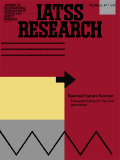
IATSS Research
Elevating engineering insights to enhance urban living.IATSS Research, published by Elsevier Science Ltd, stands as a premier open-access journal at the intersection of engineering, safety research, urban studies, and transportation. Established in 2000, this esteemed journal caters to a diverse audience of researchers, industry professionals, and students eager to delve into innovative research that addresses pressing societal challenges. With an impressive impact factor and a consistent demonstration of high-quality scholarship, IATSS Research has achieved notable rankings within Scopus, including a top-tier position in Safety Research (Rank #13/109, 88th percentile) and Engineering (Rank #46/307, 85th percentile). The journal has evolved significantly since its inception, reflecting the dynamic nature of its converged fields from 2008 to 2024. By embracing open access, IATSS Research amplifies the reach of critical findings and fosters collaboration across disciplines, making it an invaluable resource for anyone invested in advancing knowledge and practices in modern engineering and urban safety.
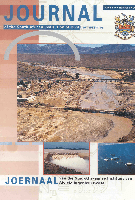
Journal of the South African Institution of Civil Engineering
Connecting professionals to shape the future of engineering.Journal of the South African Institution of Civil Engineering (ISSN: 1021-2019) is a distinguished open-access publication dedicated to advancing the field of civil engineering in South Africa and beyond. Established by the South African Institution of Civil Engineering (SAICE) and South African Institute of Steel Construction (SAISI), it serves as a critical platform for sharing research, case studies, and industry developments. The journal has been openly accessible since 2015, ensuring broader dissemination of knowledge among researchers, professionals, and students alike. Although it currently holds a Q4 ranking in Civil and Structural Engineering and is positioned within the lower percentiles in Scopus rankings, its commitment to fostering growth in the engineering sector remains strong. Covering various topics from structural design to innovative construction methodologies, the journal invites contributions that push the boundaries of current practices and methodologies. This publication is essential for those invested in sustainable engineering solutions, aiming to collaborate and contribute towards the evolution of civil engineering standards in South Africa.
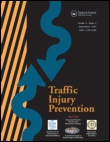
Traffic Injury Prevention
Empowering change through evidence-based strategies.Traffic Injury Prevention is a premier academic journal dedicated to disseminating critical research and innovative findings in the field of injury prevention, with a particular focus on traffic-related incidents. Published by Taylor & Francis Inc, this journal serves as a vital platform for communication among researchers, policymakers, and practitioners in public health, safety research, and environmental health. With an impressive impact factor and a robust ranking—earning a place in the Q2 quartile for Public Health, Environmental and Occupational Health, and Q1 for Safety Research—it reflects the journal's significant contributions to advancing knowledge and practice in reducing traffic injuries and fatalities. Since its inception in 2002, Traffic Injury Prevention has highlighted pivotal studies and interventions that inform best practices, encouraging a safer environment for all road users. The journal is essential reading for anyone involved in traffic safety, from researchers and public health officials to educators and students. As we look towards the future, contributions to this journal not only inform current practices but also shape ongoing research, policy, and education aimed at preventing traffic injuries worldwide.

Baltic Journal of Road and Bridge Engineering
Transforming Challenges into Engineering TriumphsThe Baltic Journal of Road and Bridge Engineering, published by RIGA TECHNICAL UNIV-RTU, serves as a pivotal platform for disseminating cutting-edge research in the fields of building and construction as well as civil and structural engineering. Established as an Open Access journal since 2006, it fosters global collaboration and accessibility to critical engineering knowledge, facilitating the exchange of innovative ideas among researchers, professionals, and students. With a commendable impact factor and recognition in Scopus rankings, where it stands in the third quartile for both relevant engineering categories, the journal underscores its significance in advancing the discipline. The journal aims to publish high-quality, peer-reviewed articles that address contemporary challenges in road and bridge engineering, making it an essential resource for anyone involved in infrastructure development and research. Located in Lithuania at 6B Kipsalas Street, RIGA LV-1658, this journal not only highlights the latest advancements but also seeks to inspire future innovations in engineering practices.